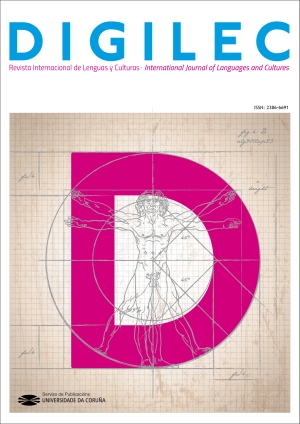Guide of findings by linguistic ambits for the commentary of non-literary texts in Baccalaureate
Main Article Content
Abstract
The non-literary text commentary is one of the fundamental objectives in the contents of Spanish Language and Literature subject at the Baccalaureate stage. In this task, the different levels or domains of language come into play linking them to a text proposed for commentary. In spite of this, students find great difficulties to identify and structure the linguistic characteristics present in the texts and teachers face the challenge of offering didactic answers to this kind of exercise. In this article a tool for the commentary is proposed that is based on a guideline of findings in the different linguistic ambits (morphological, syntactic, lexical-semantic and pragmatic). Gradually, it is intended that students analyze the linguistic features in each of these areas in a triple dimension (presence, location and purpose), identify, exemplify and justify their use depending on the text target. For this purpose, it is necessary to carry out several tasks before facing the commentary and during its practice. Finally, the teaching-learning strategy and proposal is described, as well as its sequencing and pedagogical application throughout an academic year using various methodological strategies that help to systematize the work and share it within the classroom group.
Keywords:
Downloads
Article Details
References
Colomer, T. (1996). La evolución de la enseñanza literaria. Aspectos didácticos de Lengua y Literatura, 127-171. Zaragoza: ICE de la Universidad.
Correa Calderón, E. y Lázaro Carreter, F. (1974). Cómo se comenta un texto literario. Salamanca: Anaya.
Corriente Cordero, J.M. (1990). Hacia el comentario de texto como estrategia comunicativa: proyección docente. Cauce. Revista de Filología y su Didáctica, 13, 203-218.
Cuenca, M.J. (2009). El comentario de textos: planificación, textualización y revisión. Textos. Didáctica de la lengua y de la literatura, 52, 42-56.
Domínguez Caparrós, J. (1977). Introducción al comentario de textos. Madrid: Servicio de Publicaciones del Ministerio de Educación y Ciencia.
García Elena, G.L. (2010). El comentario de textos no literarios en la Educación Secundaria Obligatoria y en el Bachillerato. Publicacionesdidacticas.com, 4. http://publicacionesdidacticas.com/hemeroteca/articulo/004113/articulo-pdf
Girón Alconchel, J.L. (1982): Introducción a la explicación lingüística de textos. Metodología y práctica de comentarios lingüísticos. Madrid: Edinumen.
López, I. (2011). El comentario lingüístico de textos como mediador de las tareas de escritura. Bellaterra Journal of Teaching & Learning Language & Literature, 4 (1), 80-101.
López Río, J. (2009). El comentario de textos: estado de la cuestión. Lenguaje y textos, 30, 11-17.
Marcos Marín, F. (1977). El comentario lingüístico. Metodología y práctica. Madrid: Cátedra.
Martín Vegas, R.A. (2018). El comentario léxico del texto literario en la enseñanza de la lengua española. Linred: Lingüística en la Red, 15. https://ebuah.uah.es/dspace/bitstream/handle/10017/34171/comentario_martin_LIN_2017_15.pdf?sequence=1&isAllowed=y
Pérez Rioja, J.A. (1975). Estilística. Comentario de textos y redacción. Bilbao: Liber.
Romero Blázquez, C. (1998). El comentario de textos literarios: aplicación en un aula de E/LE. En Celis, A. y Heredia, J.R. (Eds.), Lengua y cultura en la enseñanza del español a extranjeros: actas del VII Congreso de ASELE, 379-388. Cuenca: Ediciones de la Universidad de Castilla-La Mancha.
Sánchez Carlessi, H. (2013). La comprensión lectora, base del desarrollo del pensamiento crítico. Horizonte de la Ciencia, 3 (5), 31-38 https://dialnet.unirioja.es/descarga/articulo/5420526.pdf
Solsona Martínez, C. (2014). Didáctica de la lengua española. En J.L. Aliaga, et al. (Eds.), María Antonia Martín Zorraquino. Filología, Gramática y discurso. Artículos escogidos, 239-252. Zaragoza: Institución Fernando el Católico.


